Summary
- The mental health of U.S. teenagers has declined over the past 10 to 15 years. Symptoms of mental illness have increased, as suicide rates have doubled for girls and increased by 50% for boys.
- New Gallup survey data show that U.S. teenagers spend an average of 4.8 hours per day using social media—far more time than they spend watching television, doing homework, perusing hobbies, and playing video games. There are strong theoretical reasons to believe that teenagers both overuse social media and that it is harmful psychologically; moreover, the timing of greater use coincides with declining mental health. YouTube and TikTok account for most of teens’ time on social media, among the platforms included in this study.
- Time spent on social media predicts significantly lower mental health and higher discomfort with one’s body in simple models adjusting only for child sex and age.1 Teens who spend more than 5 hours a day on social media were 2.5 times more likely to express suicidal thoughts or harm themselves, 2.4 times more likely to hold a negative view of their body, and 40% more likely to report a lot of sadness the day before. In our study, these mental health problems were only associated with YouTube and TikTok, with no effects found for Instagram, Twitter, Facebook, or other platforms, perhaps because teens use these platforms less and/or use them for different reasons. Body image problems show significant effects associated with time spent on YouTube, TikTok, Instagram, and WhatsApp, but not the other platforms included in this study.
- Children who exhibit greater self-control and/or live with parents who restrict screen time, supervise them, and sustain a strong relationship are far less likely to spend 4 hours or more per day on social media. The negative effects of high social media use on mental health are no longer observed when matching youth on these personality and parental characteristics, and the negative effects on body image problems are cut in half, though they remain significant. In other words, screen time has no association with an index of mental health problems for teens who demonstrate high levels of self-control and enjoy a strong relationship with parents who supervise them—a minority of American teens. Yet even teens with these characteristics show greater risk of body image issues if they are heavy users of social media.
These findings can guide parents, clinicians, and public health officials about the appropriate use of social media apps and their regulation by parents, schools, and other institutions that interact with youth populations. New research on youth mental health and social media use should consider how personality traits and parenting experiences shape use and potentially bias outcome comparisons. Moreover, scholars should consider randomized trials and longitudinal studies that prioritize studying the most popular current platforms—such as YouTube and TikTok.
Declining Youth Mental Health
The largest data collection efforts on youth mental health consistently show worsening mental health from around 2011 to the present. As reported in the CDC’s Youth Risk Behavior Survey (YRBS), from 2009 to 2021, the share of high school students reporting that they had a debilitating bout of sadness or hopelessness—defined as stopping usual activities—that lasted at least two weeks out of the previous year rose from 26 to 42 percent. This large increase in sadness preceded COVID-19 but worsened during the pandemic. There were no significant changes in High School sadness rates from 1999 to 2011 in these data, but 2013 marked a shift.
Data from the University of Michigan’s Monitoring the Future project—a large scale survey of students ages 13 to 18—shows that depressive symptoms registered a large increase from 2012 to 2018 after previously falling. The percentage of boys with depressive symptoms rose from 22% to 30%, whereas the percentage of girls with depressive symptoms went from 22% to 37% over that six-year period.2
YRBS data show that self-reported suicidality is also up during the same period measured in three distinct ways—considering an attempt, making a plan for an attempt, or making an attempt. These survey-based trends align with an increase in deaths from suicide measured by the CDC, which doubled for girls from 1999 to 2022 and rose by 50% for boys (Figure 1).
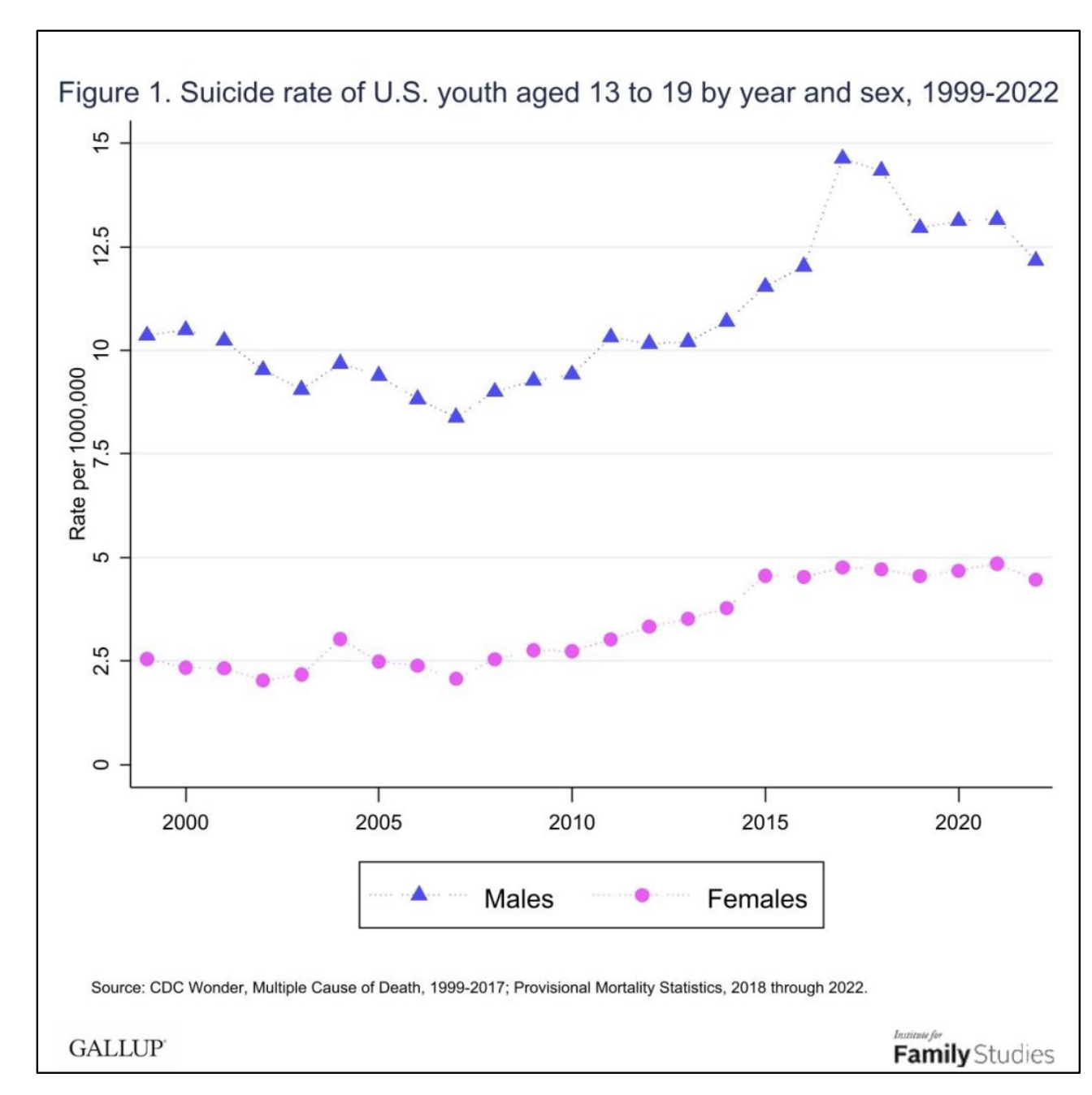
Technological Change and the Over-consumption of Social Media
What has changed during this period that could be driving the decline in youth mental health? Social psychologist Jonathan Haidt has been a leading proponent of linking this trend to the rise of smartphones and social media use. The most popular smartphone—the Apple iPhone—was launched in 2007 and quickly grew in use in the years that followed. By 2016, 77% of households had a smartphone.
There is a compelling theoretical basis for linking smartphones to mental health. There are many widely popular web-based apps that exhibit addictive or habit-forming characteristics. The companies and their software developers intentionally create and implement habit-forming design features, drawn from cognitive and psychological theories, such as variable rewards, social reciprocity, infinite scrolling, gamification, and others. These characteristics make over-indulgence extremely common, as shown in self-reported data on internet use. The level of mental difficulty in avoiding social media overuse is subjectively comparable to the level of effort needed to reach exercise and dietary goals.
Extraordinary research by Hunt Allcott and colleagues found that people over-use social media by approximately one hour per day, on average, or around one-third of their total screen time. This can be estimated from observing how people in their experiments reduced social media use if paid even a token amount to forgo the behavior. Moreover, the research team found large reductions in use when participants pre-committed to time restrictions of their own choosing the day before, so that the apps would become unavailable once the limit is reached. Temporary external restrictions on social media use led to smaller but enduring reductions in use, making social media use consistent with other habit-forming addictions.
The overuse of social media may be directly or indirectly unhealthy. Potentially harmful direct channels may follow from negative social comparisons, since social media famously portrays the most glamourous people in their best, photo-shopped conditions. These comparisons may foster envy and/or a reduction in self-esteem or self-efficacy, including obsession over appearance or extreme dissatisfaction with one’s body, as some research finds. Other direct channels may follow from social media conveying emotionally-driven, irrational, and divisive perspectives on popular culture or news issues, including false information or the popularization of anger-inducing but poorly reasoned interpretations of events. Thus, for example, my research found that media channels—social or otherwise—aroused discomfiting and irrational beliefs about COVID-19, leading to excessive fear and isolation. In these ways, social media may directly cause or exacerbate depressive or anxious symptoms, as many studies have found.
Indirect channels may also link social media use to mental health. Social media use displaces offline activities including time spent with friends and other people. This may indirectly cause harm to mental health by weakening important relationships or preventing their formation. It may displace physical activity, leading to disease, weakness, fatigue, diminished athletic performance, or other outcomes that ultimately affect mental health.
Since 2006, scholars have studied the relationship between social media use and psychological outcomes. In a large meta-analysis, Jeff Hancock and colleagues at Stanford’s Department of Communication found statistically significant raw correlations between time spent on social media and anxiety (0.14) and symptoms of depression (0.10), but no significant association with overall life evaluation (0.5).
Yet at least some of the negative effects associated with social media may result from the fact that people with lower mental health gravitate toward higher social media use, for example, to relieve boredom, escape stressful life circumstances, or fulfill needs not being met offline. There is evidence for this interpretation in that one study finds that changes in the level of social media use did not predict changes in depressive or anxious symptoms. On the other hand, these apps are extremely popular, and can be used to advertise success, and it is possible that surges in positive emotions or improvements in life circumstances may lead people to spend more time on social media, biasing longitudinal analysis.
The most compelling, practical way to study how social media affects mental health is to randomly assign social media use and observe mental health. One study did this. Allcott and colleagues paid a random-selected group of adults $50 for every hour reduction in average daily social media use over three-weeks and then tracked actual use and reports of happiness and other emotions over that subsequent three-week period. They saw large reductions in use accompanied by a modest 0.09 standard deviation increase in emotional well-being (very similar to the meta-analysis finding). In this case, well-being was measured as an index tracking agreement (or disagreement)—on a seven-point scale—with items such as “Over the past three weeks, I was a happy person.” Additional items included: “I was satisfied with my life,” “I felt depressed,” and “I felt anxious.”
Likewise, Luca Braghieri and colleagues found very similar results when looking at how the rollout of Facebook affected the mental health of college students at various campuses, irrespective of individual use. Since the rollout was practically random, this provides a compelling causal estimate at the community level. Given the preponderance of evidence, Jonathan Haidt has concluded that social media is a major cause of declining adolescent mental health.
New Data on Adolescent Social Media Use
From June 26 to July 17, 2023, Gallup collected responses from 6,643 parents who care for a child between the ages of 3 and 19 for the Gallup Familial and Adolescent Health Survey. For parents with teens between ages 13 to 19, Gallup requested permission to also survey the child with the next birthday and collected 1,580 completed surveys from adolescents who assented.
All adult respondents were members of the Gallup Panel and initially recruited through random sampling, making the panel nationally representative with appropriate weighting. Gallup statisticians created weights so that parental results could be interpretated as nationally representative of households with children between the ages of 3 and 19, by sex, age, race/ethnicity, educational attainment, and region. Child responses are weighted to be representative of households with children between the ages of 13 and 19. To study social media apps, Gallup considered data on the most popular platforms used by teenagers, according to recent sources, and also further prioritized platforms that present information—videos, messages, and photos—mainly from strangers, rather than friends, as exposure to content from strangers raises larger safety and mental health concerns.3
These data reinforce findings from the literature that young people may be over-using social media (Figure 2). The average U.S. teenager ages 13 to 19 reports spending 4.8 hours per day using social media apps. The overwhelming majority, 98%, of youth report using at least one of 7 popular apps within the past year. Nearly 30% of teens spend 6 or more hours using social media and less than 11% report using it for one hour or less. YouTube and TikTok are the most dominant platforms, followed by Instagram. These three apps comprise 87% of social media time measured in the survey. Almost all users report that entertainment is among the main reasons they use social media, and heavy users are somewhat more likely than light users to say this (88% vs 75%). Communicating with friends and family and relieving boredom are also commonly cited, with less than half using these platforms to get news or information. Time spent on social media far surpasses time spent doing other activities, such as homework, watching television, playing video games, practicing a hobby, reading for leisure, or doing chores around the house.
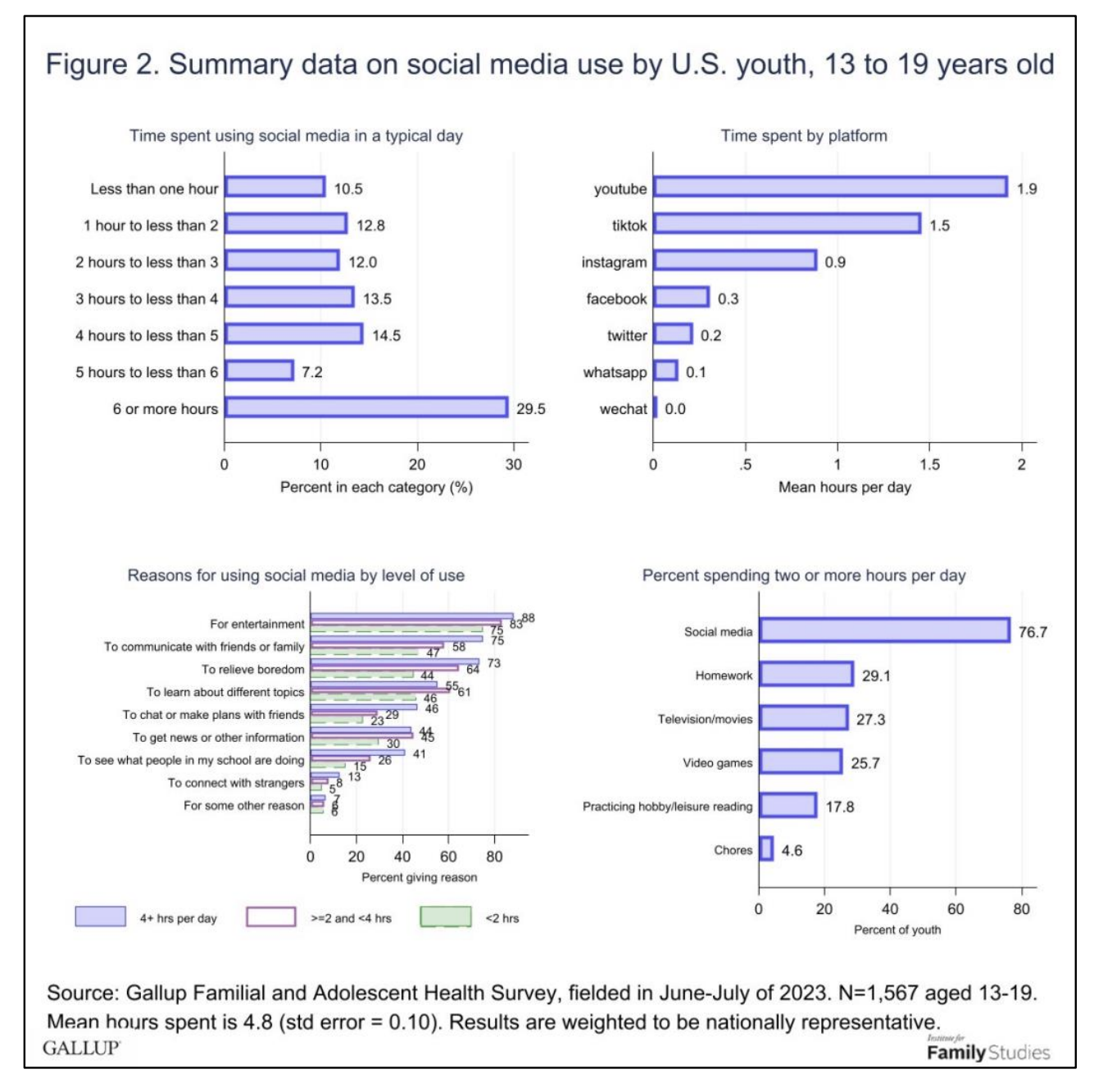
N=1,567 aged 13-19. Mean is 4.8 (std error = 0.10); median is 4. Results are weighted to be nationally representative.
The Association Between Youth Mental Health and Social Media Use
The Gallup Familial and Adolescent Health survey collected 9 summary measures of mental health, with 5 reported by parents and 4 reported by their children (see Appendix Table 1). These items were combined to create an adolescent mental health index. The items track symptoms of depression, anxiety, suicidality, and evaluative well-being, as well as overall mental health. The index has very good reliability and strong validity in that it is highly predictive of objective measures of mental and physical health, such as the number of times the child has seen a therapist in the past 30 days, and whether the child is taking prescription drugs for their mental health.
Given concerns about how social media may affect body image, the survey also fielded several items that measure comfort with the respondent’s body and concerns about appearance. A six-item body image index developed from this survey is highly correlated with the mental health index (-0.51) as well as emotional instability (0.51). The index demonstrates good reliability. High scores on this index can be interpreted as indicating distress over one’s body, but do not have a clear relationship to a psychiatric diagnosis.
Adolescents were also asked whether or not they have used any of 7 different platforms over the past 12 months, and if so, they were asked how much time they spent with each on a typical day, with responses ranging from less than 15 minutes to 6 hours or more. For each platform and cumulatively, hours were estimated using the mid-points of each response and children were recoded to fill in hourly groups, with everyone at 6 or more hours reclassified as 6, given measurement error in reporting, and the fact that this was the maximum category.
A simple description of key results confirms that social media use is associated with mental health problems (Figure 3). The survey defined low, medium, and high social media use as two hours or less, 2 to 5 hours, or five hours or more, respectively. The percentage of adolescents who expressed suicidal intent or attempted to harm themselves in the past 12 months was 5% in the low use group, and 10% in the high use group. The percentage expressing a poor body image is 6% for the low users and 17% for the high users. The share of adolescents who report feeling a lot of sadness yesterday is 22% among low users and 28% among higher users. Finally, the share of teens who rate their own mental health as poor or very poor 23% for low users versus 41% for high social media users.
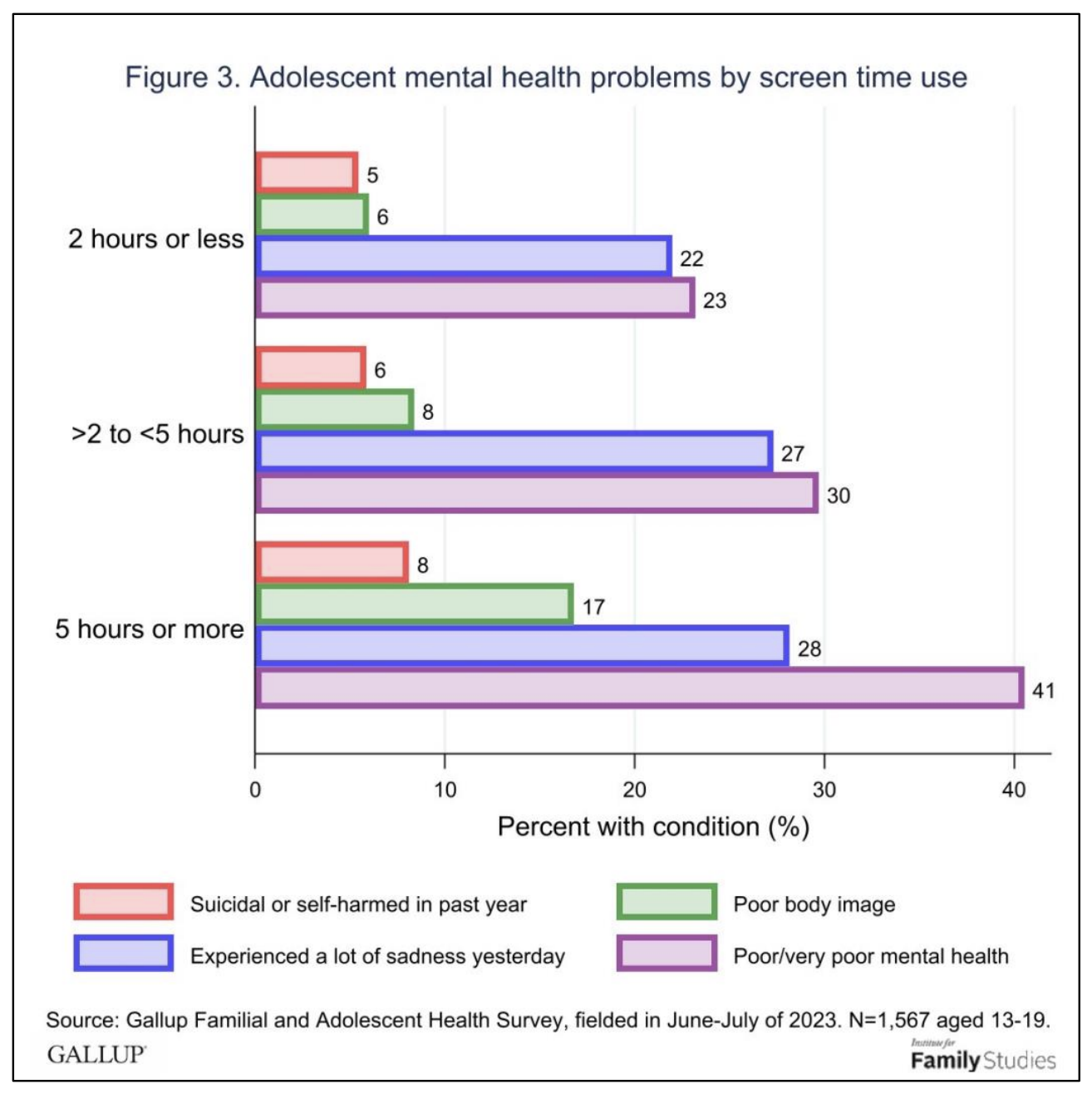
Note: N=1,567 aged 13-19. Poor body image is defined as a mean score of 3.5 or higher on a six-item scale, where higher scores indicate a more negative body image.
To more formally quantify the association between youth mental health and social media use, I started by running a simple model that calculates the correlation between the two for all social media and for each platform, adjusting only youth age and sex. The variables were standardized so the results can be compared to the meta-analysis performed by Jeff Hancock and colleagues.
As shown in Figure 2, I find that a standard deviation in social media use (approximately 2 hours per day) predicts a 0.09 standard deviation reduction in mental health, which is close to close to their estimates for depression and anxiety and happens to match the experimental effect on subjective well-being estimated by Allcott and colleagues. I would characterize this as a small but meaningful effect, associated with a modest elevation in the risk of mental health problems. Moving from less than one hour per day to five hours per day predicts a 0.18 effect on mental health, a more substantial effect.
As seen below (Figure 4), the negative effects in these data are entirely driven by the popular videostreaming apps YouTube and TikTok, which have nearly identical effects. No other platforms studied here have effects that are statistically significant. This is an important result, since much of the social media analysis has focused on other platforms, which may have since faded in popularity in recent years among young people. Even controlling for total social media time, TikTok and YouTube are the only two platforms whose use predict a negative effect on the mental health index, suggesting that it is not only through time spent that they have their effects.
Turning to the results on body image issues, the results are even more concerning. Spending four or more hours a day on social media more than doubles the risk of adolescents expressing a negative body image, according to the model’s predictions. A standard deviation of social media time predicts a 0.21 standard deviation effect on body discomfort, and while the effects are largest for YouTube and TikTok, they are also significant for Instagram and WhatsApp. The three other platforms do not show any effects.
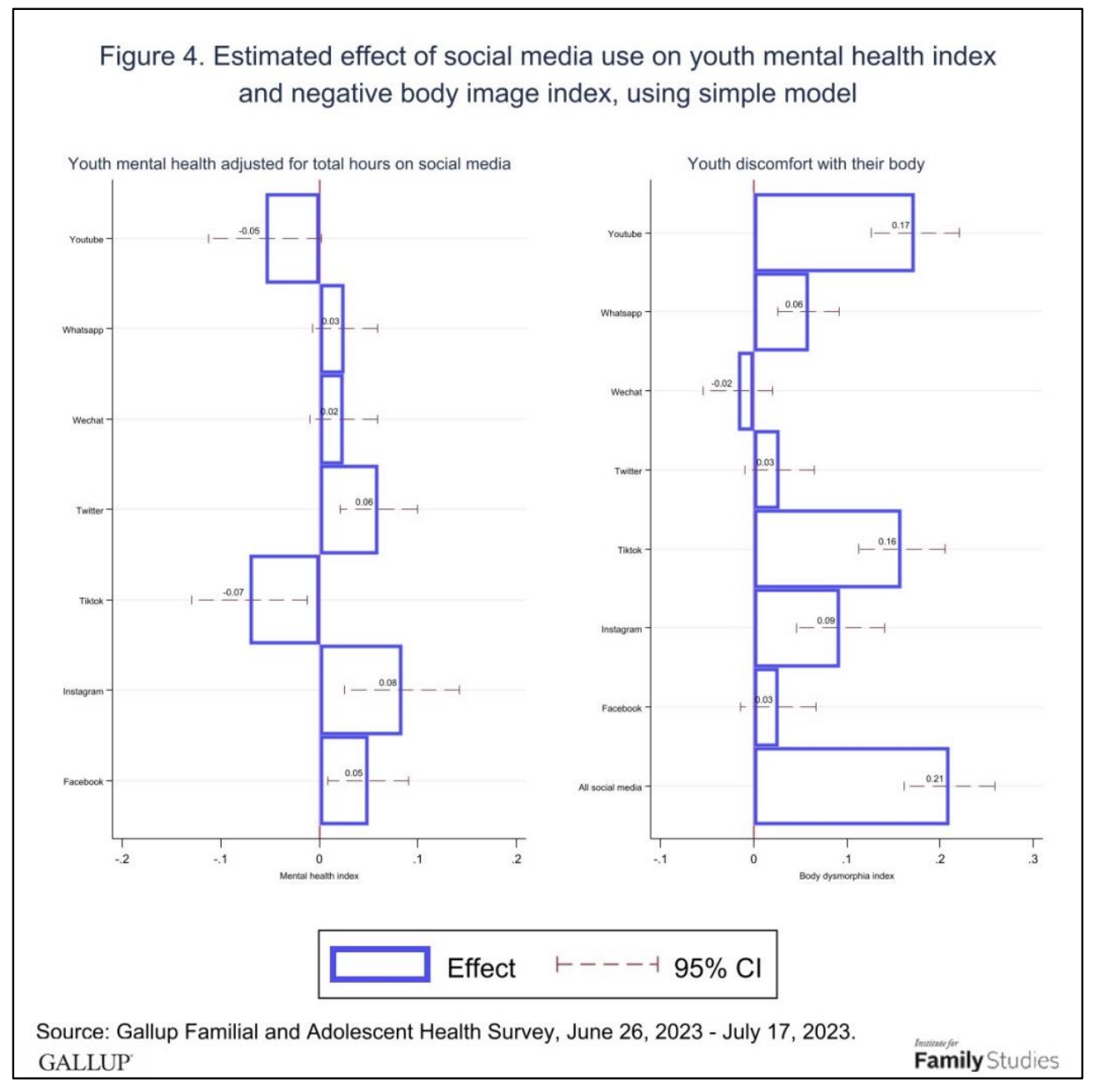
Note: Sample size is 1562 youth aged 13 to 19. Model regresses standardized measure of hours spent per day on each platform (and all combined) on mental health index (left panel) or negative body image index (right panel), adjusting for sex and age.
Another caveat to these findings is that the association of social media use with mental health problems varies by the reason for social media use. Gallup allowed respondents to select any number of eight reasons why they use social media. In a simple model, replicating the above analysis but adjusting for total social media use time, only 3 of the 8 reasons predict adverse mental health outcomes: “To connect with strangers who I wouldn’t be able to meet in real life,” to “relieve boredom,” and “some other reason.” By contrast, using social media for “communication with friends and family,” “to chat or make plans with people I see in real life,” or “to see what people in my school are doing” was associated with positive mental health, though the effect size was not significant.
These different motivations may explain why platforms have varied effects. Teens who select “to relieve boredom” as a motivation for screen time are significantly more likely than other teens to spend long hours on YouTube and TikTok. This significant relationship between boredom and time use is not observed for other platforms—and is negative and significant for Facebook. Those who select “to connect with strangers who I wouldn’t meet in real life” are likely to spend time on Twitter, Facebook, TikTok, and YouTube. YouTube is associated with learning motivations, whereas TikTok use is negatively correlated with learning motivations. Instagram is associated with communicating with friends and family and seeing what people at school are doing. Entertainment motivations predict TikTok use, but not use on other platforms. Another potential reason TikTok and YouTube platforms may have the strongest effects is that they are currently the most popular, among teenagers. Because they are the most popular, there is greater variation in use among teens.
Estimating the Causal Effect of Social Media Use, Using Observational Data
The above models are interesting, but do not tell us whether social media use causes mental health problems because social media exposure is not randomized. In the absence of a randomized trial, there is good reason to think that children who eventually come to spend a lot of time on social media are different than children who never develop such a habit, and this could bias the analysis.
For example, self-control, even when measured in childhood, is a powerful predictor of many life outcomes related to health, criminality, and income, as Terrie Moffit and others have found, and appears to be an enduring trait that overlaps with conscientiousness and other forms of self-regulation. Several measures of self-control in the Gallup survey are strongly related to social media use. Among children who report eating less than two servings of vegetables each day over the course of the last seven, social media use is high: 56% spent at least 4 hours per day. Among children who ate at least two serving of vegetables every day, only 36% spent at least 4 hours on social media. Likewise, children who scored high on conscientiousness—meaning the top-quartile using several established items—spend, on average, about 1.2 hours less per day on social media than those scoring low (in the bottom quartile). Adolescents living with a parent who disagrees that his or her child is “frequently out of control,” spend 1.4 hours less on social media than children of parents who do not disagree. Given these patterns, low conscientiousness or self-control could cause both high social media use and poor mental health, even if social media use has no effect on mental health.
Moreover, parents exert influence over whether and when their children use social media. In highly disciplined households with compliant children, parents may exert complete control over social media use. On the other hand, many parents do not regulate social media use at all, and success with enforcing social media restrictions is likely to vary based on the overall quality of the relationship with the child and the degree of parental monitoring.
The Gallup survey asked parents their level of agreement on a 5-point scale with the statement: “I restrict screen time (such as TV, tablet, or phone) to certain times of the day.” With respect to monitoring, children were asked: how many hours they spend alone or unsupervised each day. Finally, to measure the overall quality of the parent-child relationship, Gallup asked children to rate their relationship with their “parents or the people who take care of you the most” on a scale of 0 to 10, with 0 being the weakest and least loving relationship they can imagine, and 10 being the strongest and most loving.
As expected, youth-reported social media use is closely related to parent-reported regulations of screen time (Figures 5a and 5b). Still, the level of use also depends on the degree of monitoring and the overall quality of the relationship. Only 30% of youth spend 4 or more hours per day on social media when their parents restrict social media use, do not leave them unsupervised for long periods, and maintain a strong overall relationship. By contrast, when youth are unsupervised for long stretches, roughly half spend four or more hours on social media, even if the parent has a rule that restricts screen time. Parents who have no such rules on use see very high rates of social media use in their children—unless they have a strong relationship with a high degree of monitoring.
These parenting relationship patterns strongly predict youth mental health. Children whose parents invest heavily in discipline, monitoring, and loving support have children who score one standard deviation higher on the mental health index than children whose parents have a weak relationship with their child, leave them unsupervised, and do not try to restrict screen time. A future research brief will more closely investigate the relationship between parenting quality and mental health.
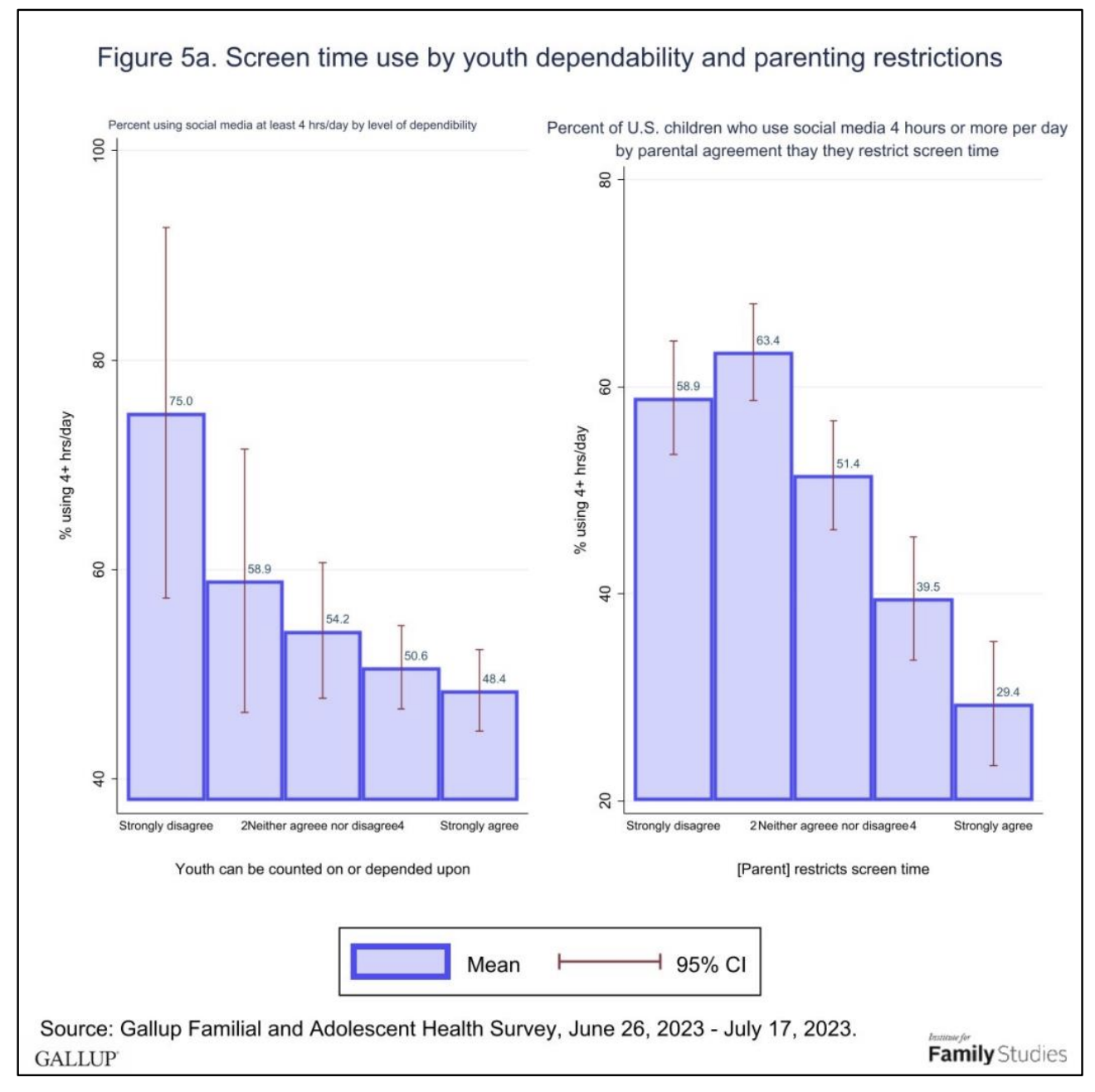
Note: The bottom panel defines high restrictions as one if the parent agrees or strongly agrees that he or she restricts screen time—and zero otherwise. High monitoring is equal to one if the youth reports never being unsupervised one typical school days or for less than one hour, and it is defined as zero otherwise. A strong relationship is defined as one if the youth reports that their relationship is an eight or higher on a 0 to 10 scale, where 10 is the strongest and most loving relationship with their parents/caretakers they can imagine.
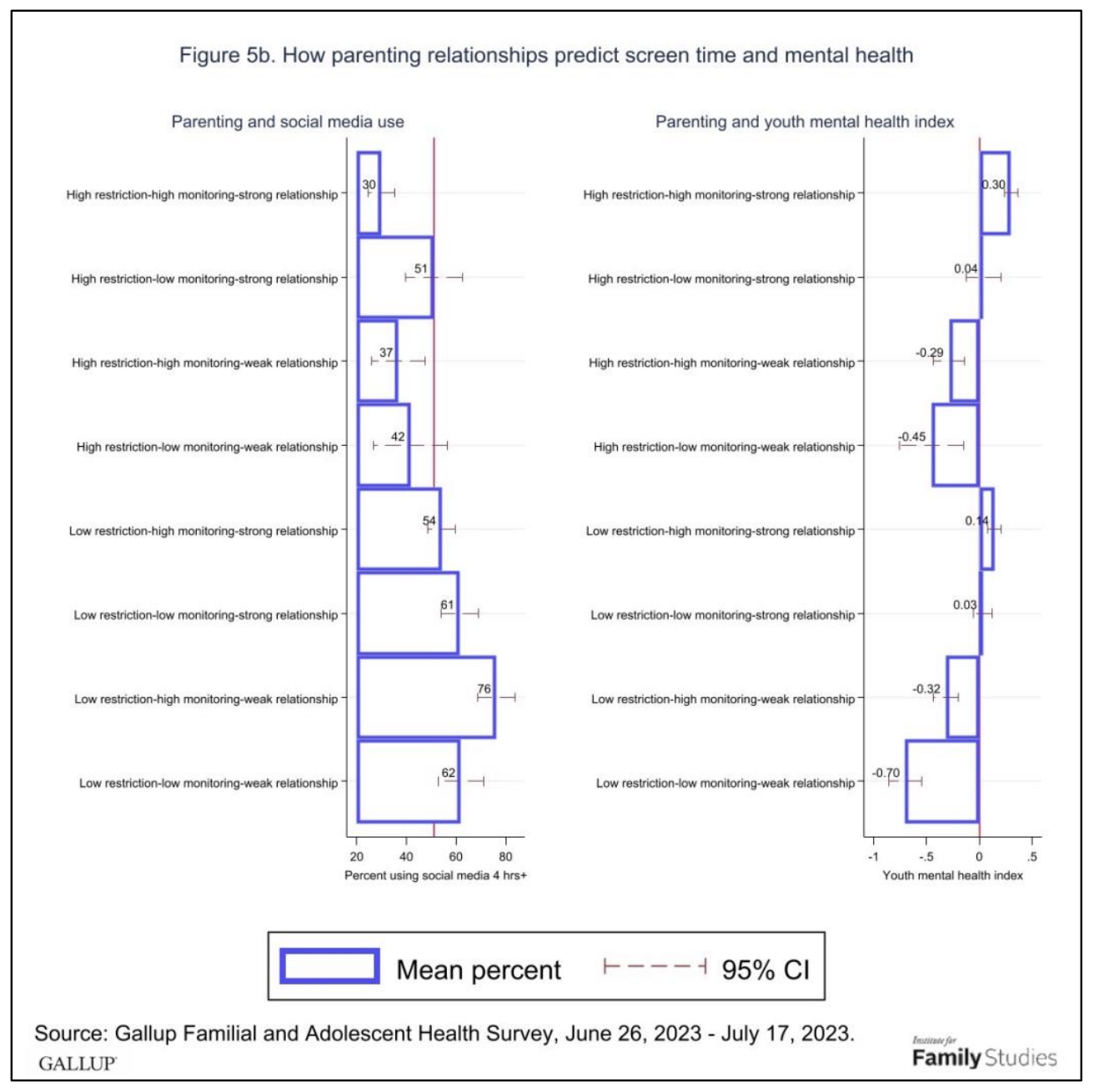
Note: The bottom panel defines high restrictions as one if the parent agrees or strongly agrees that he or she restricts screen time—and zero otherwise. High monitoring is equal to one if the youth reports never being unsupervised one typical school days or for less than one hour, and it is defined as zero otherwise. A strong relationship is defined as one if the youth reports that their relationship is an eight or higher on a 0 to 10 scale, where 10 is the strongest and most loving relationship with their parents/caretakers they can imagine.
Given these relationships, the simple model described above is likely to be heavily biased. Fortunately, economists and statisticians have created techniques to estimate a counterfactual outcome for people who were given a treatment—in this case, social media use. The most common technique is to include multiple control variables in a regression model. This will mitigate and even eliminate bias if the control variable has a linear relationship to the outcome, and the treatment variable (social media use) is independent of the outcome (mental health) given the control variables. A more advanced technique relaxes the first of these assumptions and matches respondents based on the probability of treatment. In this case, I match respondents based on the predicted likelihood that they use social media for at least 4 hours per day. The assumption is that there is a random element as to whether a given child with a similar personality and parenting relationship as another will be a heavy or light user of social media.
I run three matching models. The first matches based on sex, age, and common indicators of parental socio-economic status, as well as parental political ideology, marital status and financial security, and parenting restrictions on screen time. The estimated effect of high screen time is -.17, which is notably larger than the raw correlation (Appendix Table 2). The second model includes all these variables but also matches based on measures of child-reported self-control, such as conscientiousness and dietary practices. This model cuts the effect of social media use by half, approximately, to -0.08, and it is no longer significant. In the third model, I match based on indicators for the overall parent-child relationship and the degree of parental monitoring, defined as how much time the child spends unsupervised. This model eliminates the relationship with screen time altogether.
One interpretation is that conscientious children, who are supervised and regulated by their parents and enjoy a strong, loving relationship with them, do not seem to have different mental health patterns based on their screen time. Likewise, mental health problems are prevalent regardless of screen time for children who struggle with self-control and have weak parental relationships with little supervision. At the same time, it’s also possible that self-control and parent-child relationships may be degraded by extensive social media use on the part of teens.
I test the same models but replace mental health with the negative body image index. In all three models, the effect of social media on body image problems is large and significant, though adjusting for parenting and personality cuts the effect in half from 0.38 to 0.19. Children who struggle with body image concerns may not always manifest their symptoms as depression, anxiety, or traditional clinical signs of poor mental health. Yet high scores on the index used here are predictive of generally low well-being and several other adverse mental health conditions, so the close relationship between social media use and this outcome is grounds for concern.
To simplify these results, I show the percent of teens with the mental health problems used in Figure 3 and the percent who are heavy social media users by whether the parent-child relationship is strong and whether parental monitoring is in place (Figure 6). By far, the worst combination is low monitoring and a bad relationship. The rate of teens who express suicidal intent or self-harm is 18% in that group, which is 6 times higher than teens with a strong parental relationship that entails routine supervision of behavior. The share of teens with negative body images is 4 times higher in the low-monitoring/weak relationship group compared to the high-monitoring/strong relationship group, and the share with poor mental health is 3 times higher.
Finally, social media use itself is much more restrained when monitoring is high and the relationship with parents is strong.
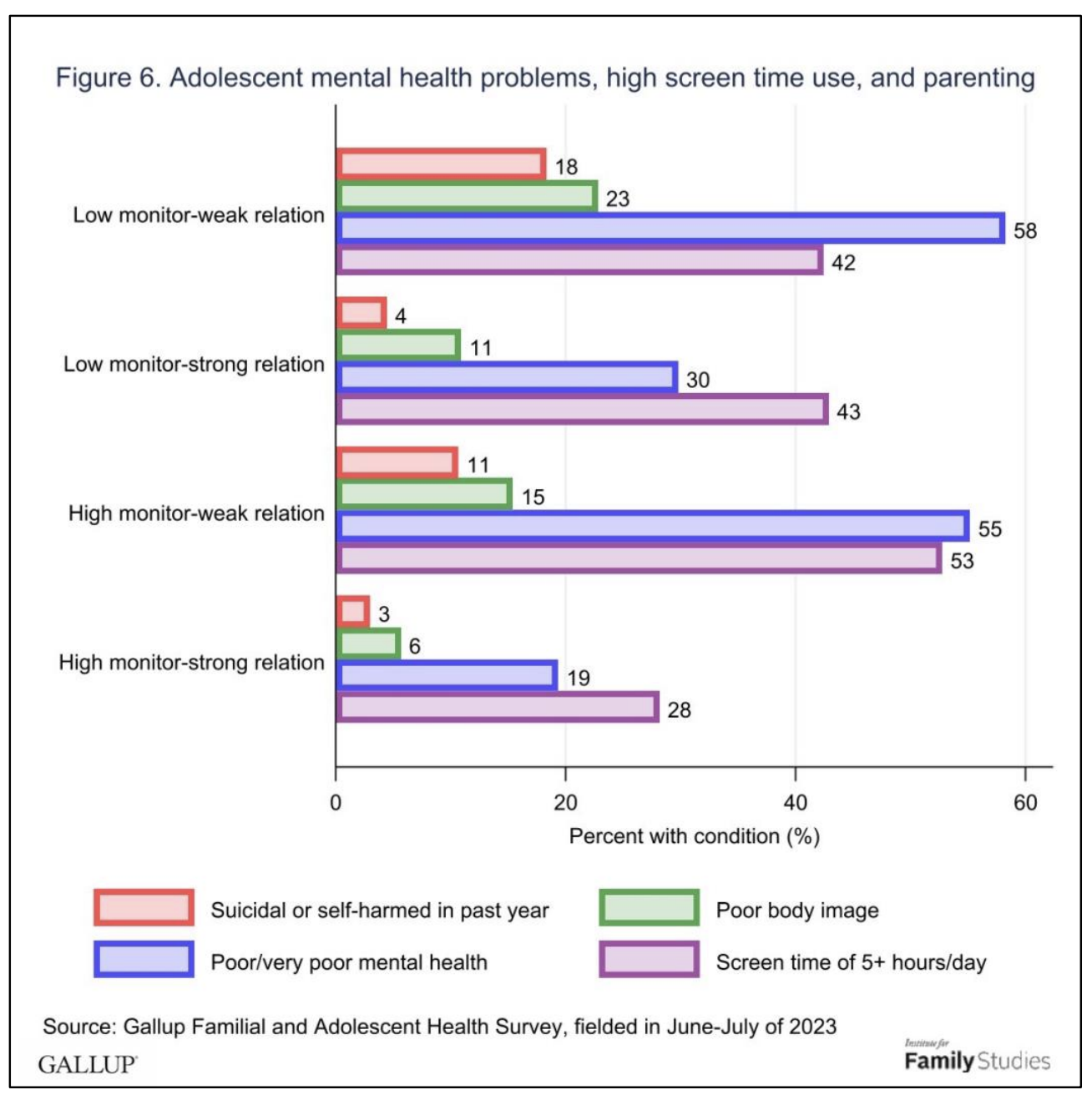
Note: N=1,567 aged 13-19. Poor body image is defined as a mean score of 3.5 or higher on a six-item scale, where higher scores indicate a more negative body image. High monitoring is equal to one if the youth reports never being unsupervised on typical school days or for less than 1 hour, and it is defined as zero otherwise. A strong relationship is defined as one if the youth reports that their relationship is an 8 or higher on a 0 to 10 scale, where 10 is the strongest and most loving relationship with their parents/caretakers they can imagine.
To illustrate how parenting mediates the effects of screen time on mental health outcomes, I recreate Figure 3 but now overlay the two most extreme parenting relationships on top of the social media use categories, so that the teens in group 1 have low-monitoring and weak relationships, and the teens in group 2 have high monitoring and strong relationships. Now, it is clear that almost all of the mental health gaps are between these two groups (Figure 7). The highest social media users sometimes have worse outcomes, such as for body image and self-reported mental health, but not for suicidality, nor for sadness.
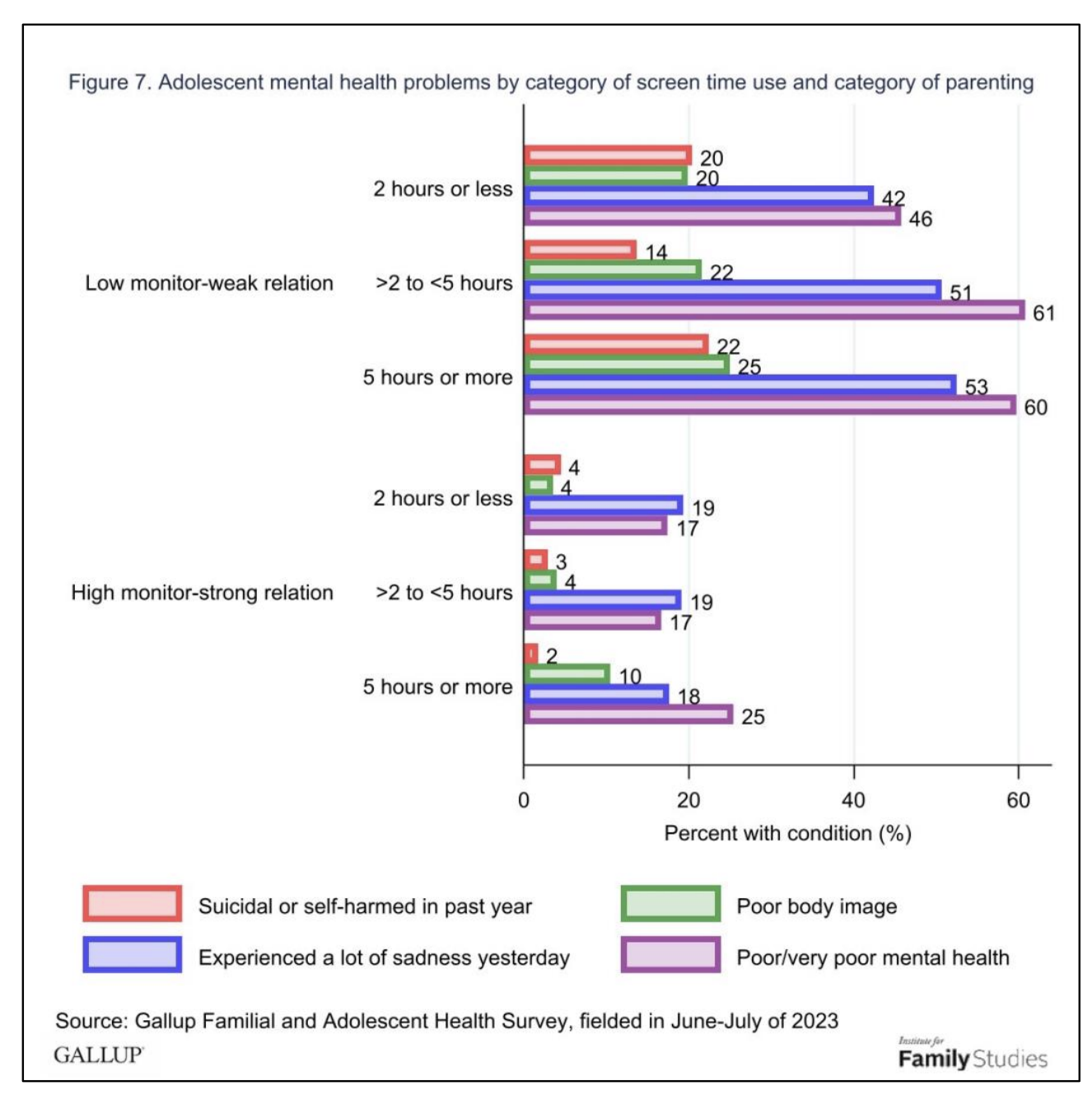
Note: N=1,567 aged 13-19. Poor body image is defined as a mean score of 3.5 or higher on a six-item scale, where higher scores indicate a more negative body image. High monitoring is equal to one if the youth reports never being unsupervised one typical school days or for less than 1 hour, and it is defined as zero otherwise. A strong relationship is defined as one if the youth reports that their relationship is an 8 or higher on a 0 to 10 scale, where 10 is the strongest and most loving relationship with their parents/caretakers they can imagine.
The Role of Parenting in Regulating Social Media Use
The strong relationship linking parenting to youth social media use and mental health raises questions about the broader role of parenting in explaining recent declines in youth mental health. Across a vast literature in psychology, parenting has proven to be a strong, robust predictor of youth mental health at any given moment in time and longitudinally. Unfortunately, there is no high-quality data showing how the quality of parent-child relationships or parenting practices have changed. There are only fragments.
We know that relative to the 1960s, parents spend more time now with their children, and more educated parents spend more time than less educated parents, but this hasn’t changed in recent years. As my analysis of Bureau of Labor Statistics data shows, in 2022, American parents spent roughly the same amount of time caring for their children as they did in 2003.
We also know that teenagers are less likely to be living with married parents. In 1968, the earliest available data from the Current Population Survey (CPS), 10% of teenagers were living with an unmarried or separated parent. By 1999, this rate grew to 21% and rose gradually thereafter to 26% in 2022.4
Time spent and family structure are very coarse variables for understanding how parenting affects youth mental health. We do not know how parenting practices and styles have changed because there are no national or even quasi-national representative surveys on parenting that have fielded the same item or items over time. Such research could prove highly valuable, given the outcomes highlighted here.
Conclusion
In the midst of declining teen mental health, many scholars have carefully investigated the role of social media, given the explosion in time spent using such applications. Psychology and marketing experts have highlighted the ways that technology companies attempt to spark and prolong engagement on their platforms, and there is strong empirical evidence showing that teenagers and young adults are susceptible to these tactics, spending more time on the platforms than they would like.
Whether the hours spent on social media are good, bad, or neutral for mental health is a complex question. The raw associations clearly say “bad.” As evidence from a new Gallup survey shows, there is no doubt that teenagers who spend long periods on social media are at much greater risk of poor mental health and holding a negative body image. This is consistent with academic literature.
Yet these new data also show that teens who gravitate toward higher social media use rate themselves as being less conscientious more generally and rate their relationships with their parents as weaker and less loving, often saying they spend long periods without parental supervision. These characteristics also predict poor mental health and, in the final analysis, seem to explain it. Relief of boredom is a common motivation for screen time, and heavy-users of YouTube and TikTok—the two platforms with the strongest negative correlations with mental health in this study—are more likely than others to indicate it. At the same time, it is possible that social media use may undermine self-control and teen-parent relationships, an issue which warrants further investigation. Still, while the risks of body image problems are reduced in the context of loving supervision, they are not eliminated, suggesting that the content on social media has a directly negative effect on how teenagers understand their bodies.
The implication is that parents are far from powerless in combating any potentially harmful effects of social media. It is up to parents and caretakers, foremost, but also school administrators and other authority figures to both foster the development of positive character traits like self-restraint and authoritatively regulate screen time and social media access. Yet it is also clear that these regulations are not enough. Without a strong relationship, the teen will likely ignore restrictions, resent them, or undermine them. As I will explore in a future brief, the parent child-relationship is paramount to youth mental health, and a strong relationship provides the most reliable foundation for addressing any external threat in the most optimal way available.
Appendix
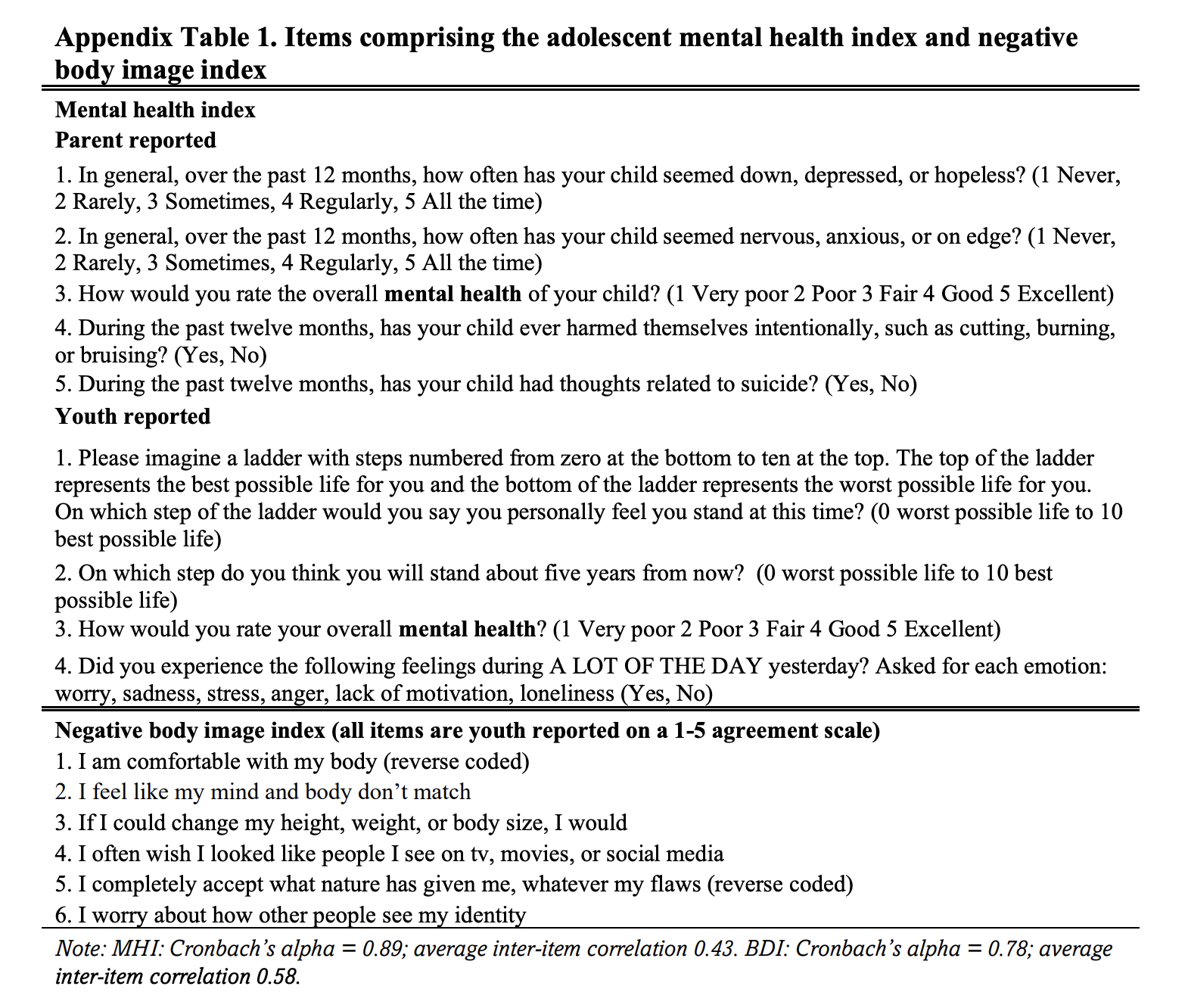
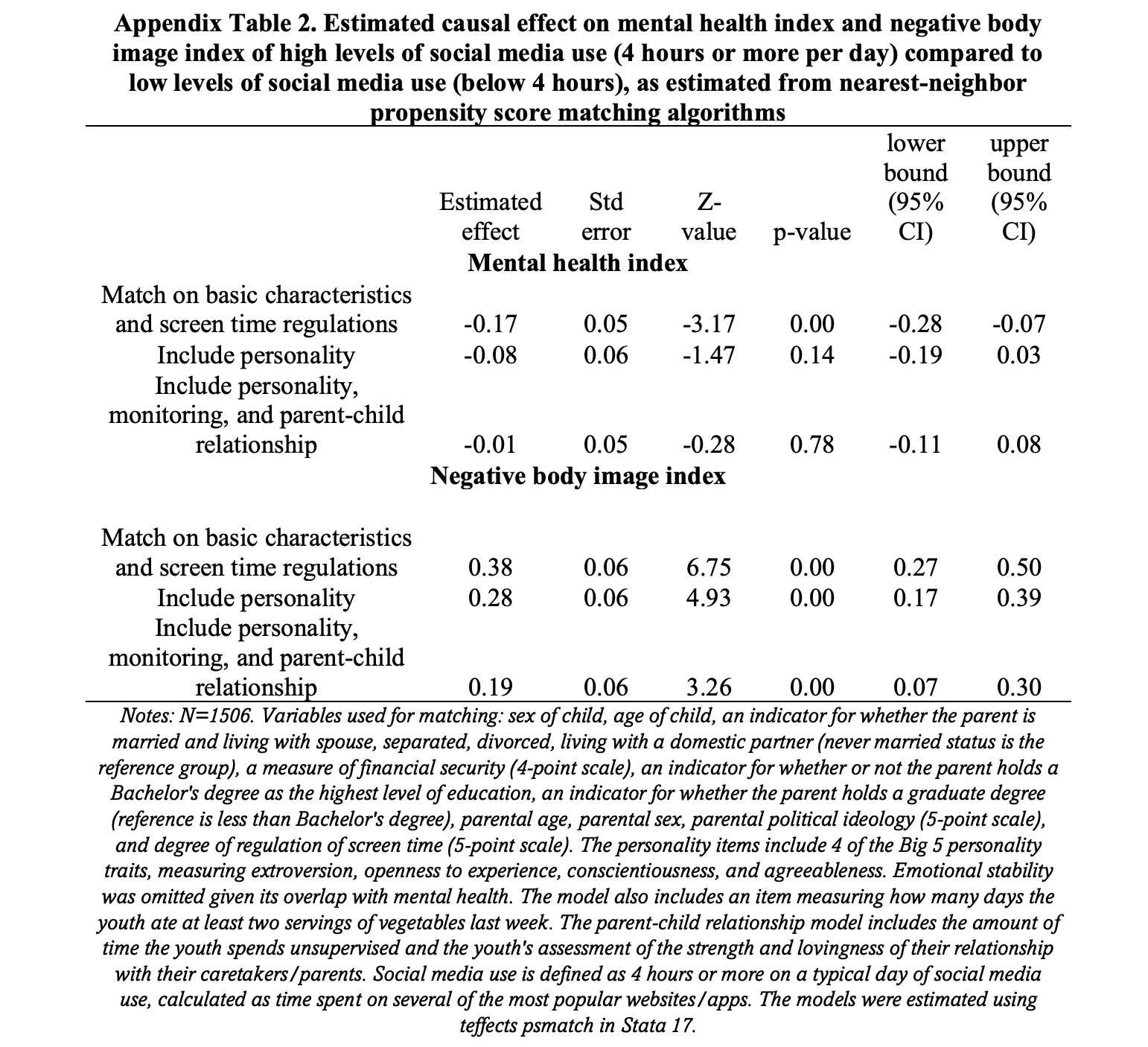
Endnotes
1. The effects are 0.09 standard deviations for mental health and 0.21 standard deviations for discomfort with one’s body. If poor mental health is defined as a standard deviation below the mean, the odds ratio for expressing poor mental health is 1.6 for adolescents spending four or more hours per day on social media. The odds ratio is 2.3 for expressing a negative body image, defined as a 3.5 or higher on our 1-5 scale.
2. These effects on mental health were 0.33 standard deviations for boys and 0.50 standard deviations for girls
3. Partly for this reason, we did not include Snapchat, but we recognize that it is popular among U.S. teenagers and does allow users to see content posted by people outside one’s friend group. We plan to study it, as well as other platforms like Discord, in the future. For further discussion, see Common Sense Media, https://www.commonsensemedia.org/articles/social-media
4. Sarah Flood, Miriam King, Renae Rodgers, Steven Ruggles, J. Robert Warren, and Michael Westberry. Integrated Public Use Microdata Series, Current Population Survey: Version 10.0 Annual Social and Economic Supplement, 1968-2022. Minneapolis, MN: IPUMS, 2022. https://doi.org/10.18128/D030.V10.0
About the Author
Jonathan Rothwell is the principal economist at Gallup and a nonresident senior fellow at the Brookings Institution.
About Institute for Family Studies
The Institute for Family Studies is an independent, non-partisan organization whose mission is to strengthen marriage and family life and advance the well-being of children through research and public education.
About Gallup
Gallup delivers analytics and advice to help leaders and organizations solve their most pressing problems. Combining more than 80 years of experience with its global reach, Gallup knows more about the attitudes and behaviors of employees, customers, students, and citizens than any other organization in the world.
Acknowledgments
The conclusions in this research brief are those of the author alone and do not necessarily reflect the views of the Institute for Family Studies. The author would like to thank Mackenzie Sullivan, Jenny Marlar, and Lydia Said of Gallup for providing edits and suggestions to the survey instrument and Anna Chan for providing survey weights. Brad Wilcox and Wendy Wang also provided helpful comments.





